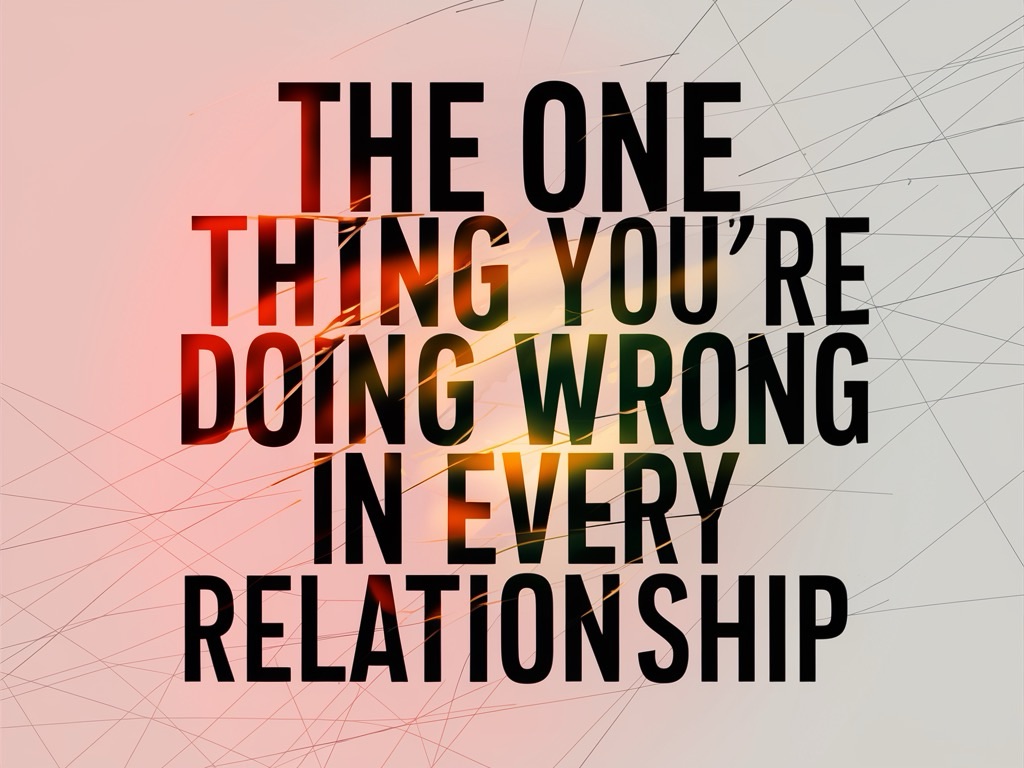
In every relationship, whether romantic, familial, or platonic, there’s one common mistake that many of us make without even realizing it. This mistake can create misunderstandings, build walls, and ultimately strain the bonds we hold dear. Identifying and correcting this mistake is crucial for cultivating healthier and more fulfilling relationships.
Understanding and addressing this issue is not only beneficial but essential for anyone looking to improve their connections with others. By learning to navigate this common pitfall, we can foster deeper intimacy, trust, and respect in all our relationships.

What is the One Thing You’re Doing Wrong in Every Relationship?
The one common mistake many of us make in relationships is poor communication. Despite the variety of forms relationships can take, from romantic partnerships to friendships and family ties, effective communication is the cornerstone of all. Without it, misunderstandings arise, feelings get hurt, and connections weaken.
Defining Poor Communication
Poor communication encompasses a range of behaviors, including not listening actively, failing to express thoughts and feelings clearly, and avoiding difficult conversations. It’s about more than just talking; it’s about ensuring that both parties understand and feel understood. When communication breaks down, it can lead to assumptions, misinterpretations, and unresolved conflicts.
Why Poor Communication is So Common
Poor communication is prevalent for several reasons:
- Fear of Conflict: Many people avoid discussing sensitive issues out of fear of conflict, leading to unresolved problems that fester over time.
- Lack of Skills: Not everyone is naturally skilled at articulating their thoughts and feelings or at listening effectively. These skills often require conscious effort and practice to develop.
- Assumptions and Expectations: People often assume that their partners, friends, or family members understand their needs and expectations without having to verbalize them.
- Emotional Barriers: Past experiences and personal insecurities can create emotional barriers that hinder open and honest communication.
Addressing poor communication involves recognizing these barriers and actively working to overcome them. By doing so, we can improve our relationships significantly.
For those looking to deepen their connection and enhance communication, consider exploring tools like an intimacy card deck designed to facilitate meaningful conversations.

How This Mistake Affects Relationships
Poor communication can have a profound negative impact on all types of relationships, from romantic partnerships to friendships and family bonds. Understanding how this common mistake manifests and the damage it can cause is crucial for addressing and improving our interactions with loved ones.
Impact on Romantic Relationships
In romantic relationships, poor communication can lead to a myriad of issues:
- Misunderstandings: Without clear communication, partners can easily misunderstand each other’s intentions, feelings, and needs. This can lead to unnecessary arguments and resentment.
- Emotional Distance: When partners don’t communicate effectively, they may begin to feel emotionally distant and disconnected. This lack of intimacy can weaken the relationship over time.
- Unresolved Conflicts: Avoiding difficult conversations to prevent conflict often results in unresolved issues that resurface later, often with greater intensity.
To avoid these pitfalls, it’s important to focus on improving communication skills within the relationship. For instance, avoiding certain phrases can significantly reduce misunderstandings. Learn more about things you should never say to your wife or girlfriend to help foster a more harmonious relationship.
Impact on Friendships
Friendships, like romantic relationships, rely heavily on good communication. Poor communication can lead to:
- Assumptions and Misjudgments: Friends may make assumptions about each other’s actions or intentions without seeking clarification, leading to misjudgments and hurt feelings.
- Lack of Support: Friends who don’t communicate openly may fail to provide the necessary support during tough times, weakening the bond.
- Drifting Apart: Over time, poor communication can cause friends to drift apart as misunderstandings and unresolved issues create distance.
Improving communication with friends involves being open, honest, and willing to discuss any issues that arise, ensuring the relationship remains strong and supportive.
Impact on Family Dynamics
In families, poor communication can create long-lasting rifts and tension:
- Generational Gaps: Differences in communication styles between generations can lead to misunderstandings and frustration.
- Unspoken Expectations: Family members often have unspoken expectations of each other, leading to disappointment and conflict when these expectations are not met.
- Emotional Strain: Poor communication can result in emotional strain, with family members feeling unsupported, misunderstood, or ignored.
To strengthen family bonds, it’s essential to work on clear and empathetic communication, addressing issues openly and respectfully.
For insights into behaviors that can positively impact relationships, including family dynamics, consider exploring things men do that women find irresistibly attractive, as these behaviors often translate well across different types of relationships.
Everyday Manifestations
Poor communication often shows up in everyday interactions through:
- Interrupting or Talking Over Others: This behavior signals that one’s own thoughts are more important than listening to others.
- Assuming Instead of Asking: Making assumptions about what someone else is thinking or feeling instead of asking directly can lead to misunderstandings.
- Avoiding Difficult Conversations: Shying away from necessary but uncomfortable discussions leaves important issues unresolved.
By recognizing these everyday manifestations, we can start to make conscious changes to improve our communication habits.

Signs You Might Be Making This Mistake
Recognizing poor communication as a key relationship mistake is the first step toward improving your interactions. Here are some signs and behaviors that may indicate you’re making this mistake in your relationships. Self-reflection and awareness are crucial for identifying and addressing these issues.
Key Signs of Poor Communication
1. Frequent Misunderstandings
If you often find yourself or your partner misunderstanding each other’s words or intentions, it might be a sign of poor communication. Misunderstandings can lead to unnecessary arguments and feelings of frustration.
2. Avoiding Difficult Conversations
Avoidance is a common sign of communication problems. If you shy away from discussing sensitive topics or addressing conflicts, these unresolved issues can build up and cause significant strain over time.
3. Feeling Unheard or Ignored
When either party feels unheard or ignored, it indicates that active listening is not happening. Effective communication requires both parties to listen attentively and validate each other’s feelings and thoughts.
4. Assumptions and Expectations
Assuming what your partner, friend, or family member thinks or feels without asking directly can lead to misjudgments and conflict. Clear communication involves expressing and clarifying needs and expectations.
5. Emotional Distance
Feeling emotionally distant or disconnected from your loved ones is a red flag. This often happens when important conversations are not happening, and both parties are not fully engaged in the relationship.
6. Interrupting or Talking Over Others
Interrupting during conversations shows a lack of respect and attentiveness. It signals that you value your own words more than the other person’s input, which can damage the relationship.
Encouraging Self-Reflection and Awareness
To improve communication, it’s essential to reflect on your behaviors and attitudes. Here are some steps to foster self-awareness:
1. Self-Reflection Journals
Keeping a journal can help you track your communication patterns. Reflect on your interactions and note instances where communication broke down. Identify what you could have done differently.
2. Seeking Feedback
Ask trusted friends, family members, or your partner for honest feedback on your communication style. They can provide insights that you might not see yourself.
3. Practicing Mindfulness
Mindfulness exercises can help you become more aware of your communication habits. Being present in the moment during conversations can improve your attentiveness and responsiveness.
4. Learning and Growth
Commit to learning about effective communication techniques. Books, workshops, and articles can provide valuable tools and strategies. For example, understanding 7 things you should never say to your wife or girlfriend can be a great starting point for improving your communication.
Recognizing these signs and taking steps to address them can lead to significant improvements in your relationships. Improved communication fosters deeper connections, builds trust, and ensures that all parties feel valued and heard.

Improving Communication to Fix the Issue
Effective communication is the foundation of any healthy relationship. By improving how we communicate, we can address the common mistakes that lead to misunderstandings and conflicts. Here are some strategies to enhance communication in your relationships, ensuring that all parties feel heard, respected, and valued.
The Importance of Communication in Relationships
Good communication fosters trust, understanding, and intimacy. It allows partners, friends, and family members to express their thoughts and feelings openly and honestly, which is crucial for resolving conflicts and building strong connections. Poor communication, on the other hand, can lead to frustration, resentment, and emotional distance.
Tips and Strategies for Improving Communication
1. Practice Active Listening
Active listening involves fully concentrating on what the other person is saying without interrupting or planning your response while they are talking. Show that you are listening through non-verbal cues like nodding and maintaining eye contact.
- Tip: Summarize what the other person has said before responding to ensure that you have understood them correctly.
2. Be Clear and Direct
Express your thoughts and feelings clearly and directly. Avoid vague statements or hints, as these can lead to misunderstandings. Being straightforward helps ensure that your message is received as intended.
- Tip: Use “I” statements to communicate your feelings without blaming or criticizing. For example, say, “I feel hurt when you don’t call” instead of “You never call me.”
3. Avoid Assumptions
Don’t assume you know what the other person is thinking or feeling. Instead, ask them directly. Assumptions can lead to misinterpretations and unnecessary conflicts.
- Tip: Ask open-ended questions to encourage the other person to share their thoughts and feelings.
4. Address Issues Promptly
Don’t let small issues fester and grow into bigger problems. Address conflicts and concerns as they arise. This prevents misunderstandings from turning into major disputes.
- Tip: Set aside a specific time to discuss important issues calmly and without distractions.
5. Stay Calm and Respectful
Maintain a calm and respectful tone during discussions, even when addressing difficult topics. Avoid raising your voice or using harsh language, as this can escalate the conflict.
- Tip: If you feel yourself getting too emotional, take a break and return to the conversation when you are calmer.
6. Be Empathetic
Try to understand the other person’s perspective and feelings. Empathy helps build a deeper connection and shows that you value their viewpoint.
- Tip: Validate the other person’s feelings by acknowledging their emotions and showing that you understand their experience.
Practical Tools for Improving Communication
Incorporating practical tools can further enhance your communication efforts. For example, using an intimacy card deckcan facilitate meaningful conversations and help partners explore their feelings and thoughts in a structured manner.
For a deeper understanding of relationship dynamics, consider reading about debunking common lies about sex, which can also provide valuable insights into improving intimacy and communication.
By implementing these strategies, you can improve your communication skills and address the common mistake of poor communication. This will lead to stronger, more fulfilling relationships where all parties feel understood and respected.

Practical Steps to Avoid This Relationship Mistake
Addressing poor communication requires conscious effort and a willingness to change. Here are practical steps you can take to avoid this common relationship mistake, emphasizing empathy, active listening, and mutual respect.
Actionable Advice to Improve Communication
1. Prioritize Empathy
Empathy is the ability to understand and share the feelings of another. By putting yourself in the other person’s shoes, you can better appreciate their perspective and respond more compassionately.
- Tip: Practice active empathy by listening without judgment and validating the other person’s feelings. Phrases like “I can see why you feel that way” can be powerful.
2. Engage in Active Listening
Active listening means fully engaging with the speaker, acknowledging their message, and responding thoughtfully. This fosters a deeper connection and ensures that both parties feel heard.
- Tip: Avoid interrupting, maintain eye contact, and provide feedback by summarizing what has been said before responding.
3. Use “I” Statements
“I” statements help you express your feelings without blaming or criticizing the other person. This approach reduces defensiveness and promotes open dialogue.
- Tip: Structure your sentences to focus on your experience, such as “I feel upset when…” instead of “You make me upset by…”
4. Schedule Regular Check-Ins
Set aside regular times to discuss your relationship. This proactive approach allows you to address issues before they escalate and reinforces your commitment to each other.
- Tip: Weekly or monthly check-ins can help maintain open lines of communication and ensure that both parties are on the same page.
5. Avoid Making Assumptions
Assumptions can lead to misunderstandings and conflicts. Instead, ask clarifying questions to ensure you understand the other person’s thoughts and feelings.
- Tip: Use open-ended questions like “Can you tell me more about how you’re feeling?” to encourage deeper conversation.
6. Stay Calm During Conflicts
Emotions can run high during disagreements, but staying calm is crucial for resolving conflicts constructively. Take breaks if needed to cool down before continuing the discussion.
- Tip: Practice deep breathing or take a short walk to regain composure before addressing the issue again.
7. Foster Mutual Respect
Respect is the foundation of any healthy relationship. Show respect by valuing the other person’s opinions, even when you disagree, and by treating them with kindness and consideration.
- Tip: Acknowledge the other person’s viewpoint and express appreciation for their willingness to communicate.
Building Positive Relationship Habits
In addition to these practical steps, building positive relationship habits can further strengthen your bond. Consider integrating activities that promote connection and understanding, such as using an intimacy card deck to spark meaningful conversations and deepen your relationship.
For insights into behaviors that can positively impact your relationships, explore things men do that women find irresistibly attractive. These behaviors often translate well across different types of relationships, fostering a sense of appreciation and attraction.
By taking these practical steps and building positive habits, you can avoid the common mistake of poor communication and create a stronger, more fulfilling relationship.

How This Mistake Manifests in Different Types of Relationships
Poor communication affects all types of relationships, but it manifests differently in romantic relationships, friendships, and family dynamics. Understanding these differences can help you tailor your approach to improving communication in each context.
Romantic Relationships
In romantic relationships, poor communication can lead to:
1. Emotional Distance
- When partners fail to communicate effectively, they may begin to feel emotionally distant and disconnected. This can erode intimacy and trust over time.
2. Unresolved Conflicts
- Avoiding difficult conversations or failing to address issues promptly can result in unresolved conflicts that build resentment and tension.
3. Misunderstandings
- Without clear and open communication, partners may misunderstand each other’s intentions, needs, and feelings, leading to frequent arguments and dissatisfaction.
Advice:
- Prioritize regular, open conversations about feelings, needs, and concerns. Utilize tools like an intimacy card deckto facilitate meaningful dialogue and deepen your connection.
Friendships
In friendships, poor communication can manifest as:
1. Assumptions and Misjudgments
- Friends may assume they understand each other’s thoughts and feelings without seeking clarification, leading to misjudgments and conflicts.
2. Lack of Support
- When communication breaks down, friends may fail to provide necessary support, causing feelings of neglect and weakening the bond.
3. Drifting Apart
- Over time, poor communication can cause friends to drift apart, as unresolved issues and misunderstandings create distance.
Advice:
- Be proactive in reaching out and maintaining open lines of communication. Discuss any issues as they arise and ensure that both parties feel heard and valued.
Family Relationships
In family dynamics, poor communication can lead to:
1. Generational Gaps
- Differences in communication styles between generations can cause misunderstandings and frustration, creating a divide within the family.
2. Unspoken Expectations
- Family members often have unspoken expectations of each other. When these expectations are not met due to a lack of communication, it can result in disappointment and conflict.
3. Emotional Strain
- Poor communication can lead to emotional strain, with family members feeling unsupported, misunderstood, or ignored.
Advice:
- Encourage open and respectful dialogue within the family. Address generational differences by finding common ground and fostering mutual understanding. For insights into behaviors that positively impact relationships, consider exploring things men do that women find irresistibly attractive, which can provide useful perspectives on positive interactions.
Adapting Communication Strategies
Recognizing how poor communication manifests in different types of relationships allows you to adapt your strategies accordingly. For example:
- In Romantic Relationships: Focus on building emotional intimacy and addressing conflicts promptly.
- In Friendships: Maintain regular contact and clarify misunderstandings quickly.
- In Family Relationships: Foster an environment of respect and open dialogue, bridging generational gaps with empathy and understanding.
By tailoring your approach to each relationship, you can effectively address the unique challenges posed by poor communication and strengthen your connections.

The Role of Self-Awareness
Self-awareness is a critical component in identifying and correcting relationship mistakes, particularly when it comes to communication. By becoming more aware of our own behaviors, emotions, and triggers, we can better understand how we impact our relationships and make necessary adjustments to improve them.
Importance of Self-Awareness in Relationships
1. Understanding Your Triggers
- Knowing what triggers your emotional responses can help you manage your reactions more effectively. This self-awareness prevents impulsive or defensive behaviors that can escalate conflicts.
2. Recognizing Patterns
- Self-awareness allows you to recognize patterns in your behavior and communication. Identifying these patterns can help you understand what contributes to misunderstandings and conflicts, enabling you to break the cycle.
3. Enhancing Emotional Intelligence
- Emotional intelligence involves recognizing and managing your own emotions as well as understanding and influencing the emotions of others. High emotional intelligence leads to better communication, empathy, and conflict resolution.
Practices for Increasing Self-Awareness
1. Journaling
- Keeping a journal can help you reflect on your interactions and identify areas for improvement. Write about your daily experiences, focusing on how you felt and how you responded in different situations.
2. Mindfulness Meditation
- Practicing mindfulness meditation can enhance your awareness of the present moment and your internal state. This practice helps you stay calm and centered, making it easier to respond thoughtfully in conversations.
3. Seeking Feedback
- Ask trusted friends, family members, or your partner for honest feedback about your communication style and behavior. Use this feedback to gain insights into how others perceive you and identify areas for growth.
4. Reflective Listening
- Practice reflective listening by repeating back what the other person has said to ensure you understand their message. This technique not only improves communication but also increases your awareness of your own listening habits.
5. Self-Compassion
- Be kind to yourself as you work on improving your self-awareness. Recognize that everyone makes mistakes and that personal growth is a continuous process.
Building Emotional Intelligence
Improving emotional intelligence is integral to better communication and stronger relationships. Here are some steps to enhance your emotional intelligence:
1. Label Your Emotions
- Accurately identifying and labeling your emotions helps you understand and manage them better. When you feel upset, take a moment to pinpoint whether you’re feeling frustrated, hurt, or anxious.
2. Practice Empathy
- Empathy involves understanding and sharing the feelings of others. Practice putting yourself in the other person’s shoes and consider their perspective before responding.
3. Develop Active Listening Skills
- Active listening involves fully engaging with the speaker, providing feedback, and withholding judgment. This practice improves understanding and builds trust in relationships.
Utilizing Tools and Resources
Incorporating practical tools and resources can further support your journey towards greater self-awareness and improved relationships. For instance, using an intimacy card deck can facilitate meaningful conversations and deepen your understanding of each other’s thoughts and feelings.
For additional insights into enhancing your relationship, consider reading about debunking common lies about sex, which provides valuable perspectives on communication and intimacy.
By cultivating self-awareness and emotional intelligence, you can identify and correct communication mistakes, leading to healthier and more fulfilling relationships.

Working Together to Overcome Relationship Issues
Addressing and overcoming relationship issues requires a collaborative effort from both parties involved. Whether in romantic relationships, friendships, or family dynamics, working together to improve communication and resolve conflicts can lead to stronger, healthier connections. Here are some strategies for collaborative problem-solving and building stronger relationships.
Collaborative Problem-Solving
1. Establish Open Lines of Communication
- Make a commitment to communicate openly and honestly with each other. This involves creating a safe space where both parties feel comfortable expressing their thoughts and feelings without fear of judgment or retribution.
2. Set Mutual Goals
- Identify common goals that both parties want to achieve in the relationship. This could be anything from improving communication to spending more quality time together. Having mutual goals helps align your efforts and fosters a sense of teamwork.
3. Create a Plan Together
- Work together to develop a plan for addressing the issues in your relationship. This might include setting regular check-ins, agreeing on communication techniques, or seeking external support like counseling.
4. Practice Active Listening
- During discussions, practice active listening by giving your full attention to the other person, acknowledging their points, and responding thoughtfully. This ensures that both parties feel heard and respected.
5. Be Willing to Compromise
- Relationships often require compromise. Be willing to find middle ground and make concessions for the benefit of the relationship. This shows that you value the relationship and are committed to making it work.
Building Stronger Connections
1. Foster Empathy and Understanding
- Empathy is crucial for understanding each other’s perspectives and experiences. Make an effort to see things from the other person’s point of view and validate their feelings.
2. Celebrate Small Wins
- Recognize and celebrate the small successes in your relationship. Whether it’s resolving a minor conflict or making progress toward a mutual goal, celebrating these wins can boost morale and strengthen your bond.
3. Engage in Shared Activities
- Spending time together doing activities you both enjoy can enhance your connection. This might include hobbies, sports, or simply spending quality time together.
4. Seek External Support
- If you’re struggling to resolve issues on your own, consider seeking external support. This could be in the form of couples counseling, family therapy, or workshops that focus on relationship skills.
5. Utilize Relationship Tools
- Incorporate practical tools to enhance your relationship. For example, using an intimacy card deck can help facilitate meaningful conversations and deepen your connection.
Tips for Specific Relationship Types
Romantic Relationships
- In romantic relationships, focus on maintaining intimacy and open communication. Address issues as they arise and work together to keep the relationship strong. For more insights, explore debunking common lies about sex to enhance your understanding of relationship dynamics.
Friendships
- In friendships, prioritize regular communication and mutual support. Be there for each other during tough times and celebrate each other’s successes. Recognize the importance of not saying hurtful things, as discussed in things you should never say to your wife or girlfriend.
Family Relationships
- In family relationships, strive to bridge generational gaps and foster an environment of respect. Address conflicts openly and work together to find solutions that benefit the entire family.
By working together and employing these strategies, you can effectively address relationship issues and build stronger, more fulfilling connections.

Long-Term Benefits of Addressing the Mistake
Addressing and correcting poor communication in your relationships can have profound and lasting benefits. These positive outcomes extend beyond the immediate improvement of interactions and contribute to the overall health and happiness of all parties involved. Here are some long-term benefits of effectively managing this common relationship issue.
Strengthened Trust and Intimacy
1. Deeper Emotional Connection
- When communication improves, so does emotional intimacy. Open and honest conversations foster a deeper understanding of each other’s thoughts, feelings, and needs, leading to a stronger emotional bond.
2. Increased Trust
- Consistently practicing good communication builds trust. When partners, friends, or family members feel heard and understood, they are more likely to trust each other and rely on the relationship for support.
Enhanced Conflict Resolution
1. Constructive Problem-Solving
- Improved communication skills enable more constructive approaches to conflict resolution. Rather than avoiding issues or engaging in unproductive arguments, individuals can address problems calmly and effectively.
2. Reduced Tension and Stress
- Effective communication reduces misunderstandings and misjudgments, which can alleviate tension and stress in relationships. This creates a more harmonious and supportive environment.
Greater Relationship Satisfaction
1. Fulfillment and Happiness
- Relationships where communication is prioritized tend to be more fulfilling and satisfying. Individuals feel valued and respected, contributing to overall happiness and well-being.
2. Long-Lasting Bonds
- Strong communication helps build resilient relationships that can withstand challenges over time. Whether in romantic partnerships, friendships, or family dynamics, these bonds are more likely to endure and thrive.
Personal Growth and Development
1. Increased Self-Awareness
- Working on communication skills often leads to greater self-awareness. Individuals become more attuned to their own behaviors, triggers, and emotional responses, fostering personal growth.
2. Enhanced Emotional Intelligence
- Improved communication skills contribute to higher emotional intelligence, which benefits all areas of life. Emotionally intelligent individuals are better equipped to navigate complex social situations and build positive relationships.
Practical Applications of Improved Communication
1. Better Work Relationships
- Enhanced communication skills are not limited to personal relationships. They also improve professional interactions, leading to better teamwork, collaboration, and workplace harmony.
2. Stronger Community Connections
- Good communication extends to interactions within your community. Whether it’s with neighbors, local organizations, or social groups, clear and respectful communication fosters positive connections and a sense of belonging.

Tools and Resources for Continued Improvement
Maintaining and further developing your communication skills requires ongoing effort and the right tools. Consider incorporating resources that support your journey, such as:
- Intimacy Card Decks: Using an intimacy card deck can help keep conversations meaningful and engaging.
- Educational Articles: Reading about debunking common lies about sex provides insights into improving intimacy and communication.
- Behavioral Insights: Understanding things men do that women find irresistibly attractive offers practical tips for enhancing your interactions.
By addressing poor communication and committing to continuous improvement, you can enjoy these long-term benefits and build relationships that are not only resilient but also deeply fulfilling.
As an Amazon Associate we earn from qualifying purchases through some links in our articles.
